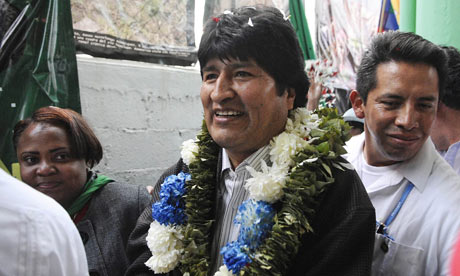
On Monday the Argentine government recognized a "free and independent” Palestinian state.
In a letter written from Argentine President Cristina Kirchner wrote to Palestinian leader Mahmud Abbas, the South American government officially
recognizes Palestine based on the 1967 borders. Furthermore, Argentina claimed that such a recognition “reflected a general consensus” in the Mercosur economic bloc whose members are Argentina, Brazil, Paraguay and Uruguay.
On Friday the Brazilian Foreign Ministry emitted a similar statement to the one announced today by Argentina. ”Considering that the demand presented by his Excellency (Abbas) is just and consistent with the principles upheld by Brazil with regard to the Palestinian issue, Brazil, through this letter, recognizes a Palestinian state on
the 1967 borders,“ read the statement. Thus, both Argentina and Brazil would back Palestinian demands for a state in areas controlled by Israel (i.e. most of the Gaza Strip, the West Bank and east Jerusalem).
Israeli and U.S. officials who already critiqued Brazil’s move will likely condemn Argentina’s decision. A cable from the Israeli Foreign Ministry accused Brazil of “advancing in a
unilateral manner” by circumventing the 2003 Middle East roadmap for peace. “Brazil is sending a message to the Palestinians that they need
not make peace to gain recognition as a sovereign state,” said U.S. Congressman Eliot Engel to Bloomberg.
Despite the controversy a Brazilian official told Politico.com that recognizing a Palestine state “was
the natural thing to do." Indeed over 100 countries, mostly from Africa and the Middle East, have already recognized a Palestinian state. More crucially, however, Brazil becomes the last of the emerging BRIC countries (Brazil, Russia, India, China) to do so.
In the meantime it appears as if other Latin American states will soon
follow the example set by Argentina and Brazil:
Following Brazil and Argentina's footsteps, Uruguay announced Monday that it recognizes an independent Palestinian state based on 1967 borders, according to AFP.
"Uruguay will surely follow the same path as Argentina in 2011," Uruguayan Deputy Foreign Minister Roberto Conde told AFP.
"We are working towards opening a diplomatic representation in Palestine, most likely in Ramallah," he said.
Image-
PRESS TV (“Acting Palestinian Authority Chief Mahmoud Abbas (L) and Argentine President Cristina Kirchner.”)
Online Sources- AFP, Mercopress, PRESS TV, Bloomberg, Politico.com, Jerusalem Post
 * Vatican: According to diplomatic cables released by Wikileaks Vatican officials were "offended” by an Irish investigation into alleged child abuse while the Holy See backed U.S. efforts in 2004 to ban “human cloning.”
* Vatican: According to diplomatic cables released by Wikileaks Vatican officials were "offended” by an Irish investigation into alleged child abuse while the Holy See backed U.S. efforts in 2004 to ban “human cloning.”













